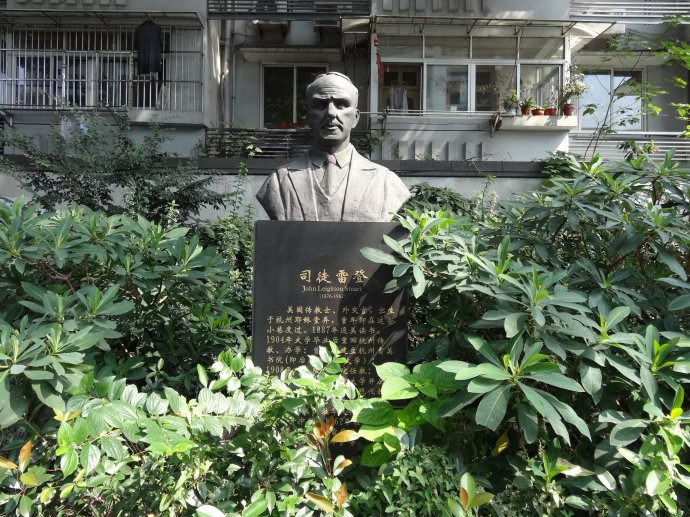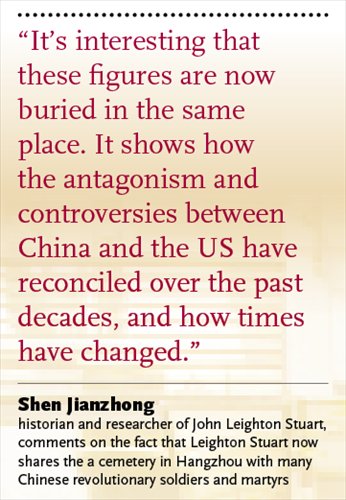

President Xi Jinping's speech at a G20 banquet gave belated recognition to John Leighton Stuart, a missionary, educator and diplomat born in China who was for decades seen as a symbol of US aggression in China.

A bust of John Leighton Stuart in Hangzhou. (File photo)
On September 4, during a banquet held to welcome the heads of foreign delegations attending the G20 Summit in Hangzhou, Chinese President Xi Jinping cited several historical and current examples to show Hangzhou has close ties with many countries.
Among the names he mentioned including Italian priest Matteo Ricci, Indian poet Rabindranath Tagore and South African politician Nelson Mandela who all either wrote of or visited Hangzhou was Situ Leideng, the Chinese name of US missionary, educator and later ambassador John Leighton Stuart.
"A hundred and forty years ago, in June 1876, Mr. John Leighton Stuart, the former US ambassador to China, was born here in Hangzhou. He went on to live in China for over 50 years and was buried in Hangzhou," Xi said.
This is the first time that a top Chinese leader has mentioned Leighton Stuart, who has long been a controversial figure in China, in a public speech. For decades, Chinese people have been taught in school that the American China expert and last US ambassador to China prior to the 1949 establishment of the People's Republic of China, was a symbol of US aggression - which is how Chairman Mao Zedong described him in his famous essay "Farewell, Leighton Stuart" which was published in August 18, 1949.
Mao's famous verdict not only influenced the image of Leighton Stuart in the minds of generations of Chinese, but also prevented him from returning to China - even after his death. Leighton Stuart died in Washington in 1962, and his last wish was to be buried in the land of his birth. Despite repeated attempts by Leighton Stuart's friends, this wasn't realized until 2008, partially due to the efforts of Xi Jinping, then China's vice president.
"It is profoundly meaningful that President Xi mentioned Leighton Stuart in his speech at such a high-level occasion like the G20. It's an official recognition of Leighton Stuart, and it shows China's resolve to get disputes between China and the US under control," Shen Jianzhong, historian and author of two books on Leighton Stuart, Walk into the Life of John Leighton Stuart and Biographical Paintings of John Leighton Stuart, told the Global Times.
Bad reputation
In August 1949, when victory in the civil war was imminent for the Communist Party of China (CPC), the Truman administration recalled then ambassador John Leighton Stuart back to the United States, and published a White Paper on China explaining why US policy in the country had failed.
The White Paper, a 1,054-page document officially entitled "United States Relations with China," was an attempt to justify US policy toward China, portraying Chiang Kai-Shek's Kuomintang regime as inefficient and corrupt and referring to the CPC victory as "the fall of China to Communists."
The White Paper increased already fervent anti-American popular sentiment in China. About 10 days after it was published, Mao wrote the satirical and incisive "Farewell, Leighton Stuart," referring to John Leighton Stuart as "a symbol of the complete defeat of the US policy of aggression."
"The article was actually a response to the US White Paper, and he mentions Leighton Stuart in the article as a symbol of the US government. It was not intended to be targeted at Leighton Stuart personally," Shen said.
The article, written as an editorial for the Xinhua News Agency, was later included in the Selected Works of Mao Zedong in the 1960s, with a note referring to Leighton Stuart as "a loyal agent of US cultural aggression in China." It was also included in China's Chinese language class textbooks, and the image of Leighton Stuart as a representative of imperialism and capitalism, and of the US as China's enemy, was imprinted into the mind of generations of Chinese.
Leighton Stuart later wrote in his memoir Fifty Years in China that "I have felt acutely the irony of my having been my country's Ambassador to China at a time when all that I had previously accomplished in the country to which I was accredited was apparently being destroyed."
Legacy of learning
The history of the Stuart family in China is a history of Sino-US relations from the late Qing Dynasty to the People's Republic.
John Leighton Stuart was born in Hangzhou to Presbyterian missionary parents from the US. His father, who arrived in China in 1868, was one of the first Presbyterian ministers sent to China from the US. His mother, Mary Horton, was the founder of the Hangzhou School for Girls, one of the first institutions of its kind in China.
John Leighton Stuart, who spoke fluent Chinese, also became a missionary in China. In 1908, He became a professor at the Nanking Theological Seminary.
But Leighton Stuart didn't stop at theology, and many historians agree that the biggest legacy Leighton Stuart left to China was in education. He helped establish Yenching University in Beijing, which was formed out of the merger of four Christian colleges between the years 1915 and 1920, and became its first president.
The university introduced Western-style university education to China, and formed partnerships with many prestigious US universities including Harvard, Princeton and the University of Missouri. It also supported Chinese nationalism, and many of Yenching's students were critical forces in the revolutionary May Fourth Movement and the May Thirtieth Movement.
As he resisted their aggression in China, the Japanese incarcerated Stuart in Beijing for over three years from December 1941 to August 1945.
John Leighton Stuart served as US ambassador to China from 1946 to 1949, mediating between the Kuomintang and the Communists when the Chinese Civil War was at its most critical moment. "He was an idealist, not a professional diplomat. He said China should learn from the US government and the Kuomintang and Communists should form one government, but his idealism was not possible in China, and he was facing a dilemma," Shen said.

Hard homecoming
After Leighton Stuart died, Philip Fugh, longtime senior aide to John Leighton Stuart who also left China for the US in 1949, kept his ashes at his home, waiting for the day when he could find an opportunity to send Leighton Stuart back to China.
In 1973, after China and US resumed diplomatic relations, Fugh visited China. In 1984, Fugh visited China again. During both trips, Fugh tried to persuade Chinese officials to allow Leighton Stuart to be buried in China, but was rebuffed.
In 1985, through a friend, Fugh sent a letter to then Chinese leader Deng Xiaoping, hoping he could allow Leighton Stuart's ashes to be buried in Peking University, which now owns the former campus of Yenching University. The letter stressed that Leighton Stuart was born in China and regarded China as his home, and both his parents and wife were buried in China.
Fugh decided to visit China next May for the burial ceremony. But bad news soon came: some people in Peking University were against the burial, and the ceremony was "postponed" indefinitely.
"Some of those who opposed the burial were former students at Yenching University, and they still think of Leighton Stuart as an imperialist," Shen said, adding that many former students, including diplomat Huang Hua and poet Bing Xin, supported Stuart's ashes being returned to Beijing.
After Fugh died in 1988, the responsibility to execute the will of John Leighton Stuart fell to his son John Fugh, the first Chinese American to attain general officer status in the US Army. In 1998, before then US president Bill Clinton made his China visit, John Fugh used his connections to express to Clinton's entourage and the US embassy in China his hope that Leighton Stuart could return to China.
When Clinton visited Peking University, he mentioned Leighton Stuart as its first president. "In June 1919, the first president of Yenching University, John Leighton Stuart, was set to deliver the very first commencement address on these very grounds," Clinton said in the speech.
The next year, Fugh's family was notified that Peking University had agreed to allow Leighton Stuart's ashes to be buried in its campus, after reporting to the central government.
But just as they were getting ready to deliver the ashes, US bombs hit the Chinese embassy in Belgrade, then part of Yugoslavia, hugely increasing tensions between China and the US. The burial was postponed again.
Fast forward to 2006, the next chance came when Xi Jinping, then vice Party secretary of Zhejiang Province, visited the US, and John Fugh voiced his appeal to Xi in Washington. In 2008, 46 years after the death of John Leighton Stuart, his ashes were finally laid in a cemetery in Hangzhou, his birth city about two hours south of Shanghai.
Today, Leighton Stuart shares the same cemetery in Hangzhou with many Chinese soldiers who fought in the war against anti-Japanese aggression, as well as Wang Wei, the People's Liberation Army air force pilot whose plane crashed into a US Air Force reconnaissance plane in the South China Sea on April 1, 2001, causing a major diplomatic crisis between China and the US over who should take responsibility.
"It's interesting that these figures are now buried in the same place. It shows how the antagonism and controversies between China and the US have reconciled over the past decades, and how times have changed," Shen said.
 Fire brigade in Shanghai holds group wedding
Fire brigade in Shanghai holds group wedding Tourists enjoy ice sculptures in Datan Town, north China
Tourists enjoy ice sculptures in Datan Town, north China Sunset scenery of Dayan Pagoda in Xi'an
Sunset scenery of Dayan Pagoda in Xi'an Tourists have fun at scenic spot in Nanlong Town, NW China
Tourists have fun at scenic spot in Nanlong Town, NW China Harbin attracts tourists by making best use of ice in winter
Harbin attracts tourists by making best use of ice in winter In pics: FIS Alpine Ski Women's World Cup Slalom
In pics: FIS Alpine Ski Women's World Cup Slalom Black-necked cranes rest at reservoir in Lhunzhub County, Lhasa
Black-necked cranes rest at reservoir in Lhunzhub County, Lhasa China's FAST telescope will be available to foreign scientists in April
China's FAST telescope will be available to foreign scientists in April "She power" plays indispensable role in poverty alleviation
"She power" plays indispensable role in poverty alleviation Top 10 world news events of People's Daily in 2020
Top 10 world news events of People's Daily in 2020 Top 10 China news events of People's Daily in 2020
Top 10 China news events of People's Daily in 2020 Top 10 media buzzwords of 2020
Top 10 media buzzwords of 2020 Year-ender:10 major tourism stories of 2020
Year-ender:10 major tourism stories of 2020 No interference in Venezuelan issues
No interference in Venezuelan issues
 Biz prepares for trade spat
Biz prepares for trade spat
 Broadcasting Continent
Broadcasting Continent Australia wins Chinese CEOs as US loses
Australia wins Chinese CEOs as US loses